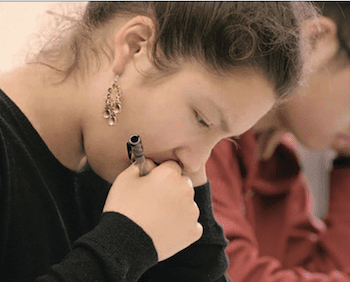Do College Entrance Exams Help or Hurt Students?
A New Film Challenges the Multi-Billion Dollar Test Industry
By Brad Kava
Every year more than 7 million high school students pull out their Number 2 pencils and go through a drill about as pleasant as having a cavity filled—-only it takes longer.
For almost a century the SAT and ACT tests have been required by many colleges looking to determine how high school students will do in higher education. Only, in recent years, there has been pushback against the tests by educators who claim they don’t really measure aptitude, they favor students from wealthier homes who can afford paying for test tutors and they skew toward those who have a talent for taking tests, rather than those with other aptitudes.

In the new documentary The Test & the Art of Thinking, filmmaker Michael Arlen Davis examines the tests through interviews with students, parents, counselors, test-prep professionals and academics, to provide a fascinating look at this American rite of passage and how it reflects deeper issues in the educational system — and society as a whole.
“These tests are like the story of the emperor who has no clothes,” said Shannon Kelly, the upper school director at Mount Madonna School. “We understand that doing well on these exams has no bearing on college success, yet we are all forced to participate in the farce. I hope that this important film will open up the discussion around standardized testing and how this impacts students and our entire education system.”
Leon Botstein, president of Bard College in New York, agrees.
“Mathematics, science, being able to use the English language, these tests don’t measure it and they don’t improve it. So why do they exist?” he asks in the film.
The tests were originally based on Army IQ exams and first given in 1926 as college admissions tests, according to Prep Scholar.com They were first thought to be a way to help underprivileged students get into college by showing their aptitudes deserved the same higher education that wealthier students could get. It was a way to get them scholarships.
But they’ve evolved into an arms race as parents pay tutors to help raise their kids’ scores—basically the opposite of its original purpose.
SAT once stood for Scholastic Aptitude Test, but after criticism that it didn’t really measure aptitude, the nonprofit College Board, which administers the tests, first changed the middle word to assessment and then dropped the acronym entirely, saying SAT doesn’t stand for anything, according to a history in Magoosh.com.
But for many high school seniors, it stands for torture and chewed up pencil erasers.
The College Board, which was founded in 1900 and represents 6,000 colleges, is trying to level the playing field, according to Aptos High School Assistant Principal Julie Edwards, who is also a college and career counselor.
“There is free tutoring online where they can evaluate PSAT scores and help you with free online courses at the Khan Academy,” she said. Students at her school take free practice SATS in their sophomore and junior years to prepare for the college exams.
“Kids who take those are shown to do better later on,” she said. “Anything in life, the more experience you have, the better you will do. That’s why we provide PSATs. We want all of our students to have that advantage.”
An organization called Fairtest.org has put pressure on the College Board to move away from the standardized tests as a way to measure abilities. The website has a list of a thousand accredited colleges that don’t use SATs or ACTs to determine who should be admitted to their schools.
Included on the list are Bates, Bowdoin, Furman, Holy Cross, Pitzer, Sewanee, Smith, Wesleyan, Whitman, American, Brandeis, George Washington, Wake Forest and Worcester Polytechnic.
“Studies show that an applicant’s high school record – grades plus course rigor – predicts undergraduate success better than any standardized exam,”said FairTest Public Education Director Bob Schaeffer, who urges K- 12 schools to back off their testing obsession.
“By going test-optional, colleges increase diversity without any loss in academic quality. Eliminating testing requirements is a ‘win-win’ for both students and schools.”
In February, Mount Madonna School will host two public screenings of the film: Thursday, Feb. 7 at the Resource Center for Nonviolence in Santa Cruz; and Thursday, Feb. 28 at the Community Playhouse in Morgan Hill. General admission tickets are $5, and go on sale January 1 at MMSFilmScreening.brownpapertickets.com.





